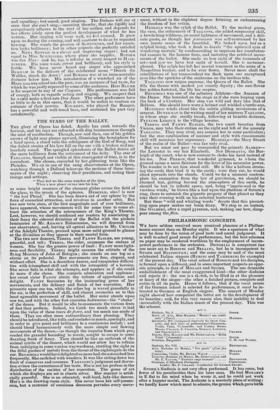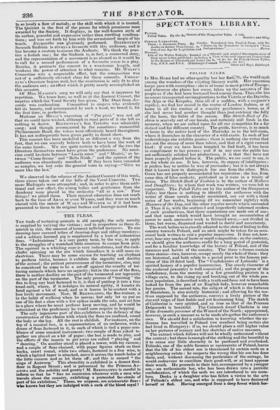PHILHARMONIC CONCERTS.
WE have seldom received more unmixed pleasure at a Philhar- monic concert than on Monday night. It was a specimen of what may be done by the union of good taste and sound judgment. It is well to select good music for performance, but the best schemes on paper may be rendered worthless by the employment of incom- petent performers in the orchestra. DONZELLI is competent (no one more so) to ROSSINI and BELLINI, but he is incompetent to SPOHR and BEETHOVEN; and the same may be said of the most celebrated Italian singers (Ruin NI and TAMBURINI for example) of the present day. Tile vocal school of Rossim and his disciples, is formed upon a different, and in some important respects an oppo- site principle, to that of MOZART and SPOHR. The one demands embellishment of the most exaggerated kind—the other disdains and rejects it : the one is a sk..1tch, to be filled in at the pleasure or fancy of the singer—the other a finished picture, complete and entire in all its parts. Hence it follows, that if the vocal music of the German school is selected for performance, it must be in- trusted to German or English singers. The concert of Monday night showed how competent the latter are to the development of its beauties ; and, for this very reason also, their inability to deal successfully with the Italian music of the present day. This was the scheme.
ACT I.
Sinfonia, No. I. SPOHR. limit. ed Aria, Miss Massokr," Month I ma vendi- cata"(Teseo) HANDEL. Quintetto, MS. (composed expressly for these Con- certs, and first time of performance) Pianoforte, Violin, Viola, Victoucello, and Contra Basso, Messrs. CRAMER, F. CRAMER, MORALT, LINDLEY, and DRAGONETT1 CRAMER. Duetto, Miss MASSON and Mr. BoaxcAmE, " Bella Nina" (Jessonda) SPOHR. Overture, Euryarithe C. M. VON WEBER. ACT u. Sinfonia, No. VII. BEETHOVEN. Aria, Madame DE MERIC, " Per picas" (Cost fan tune) MOZART. Concertino, Violin, Mr. HENRY WOLFF WOLFF. Terzetto, Madame DE MEMO, Mr. HORNCASTLE, and Mr. E. TAYLOR, " Tremate empi tremato" BEETHOVEN. Overture, L' Hrdellerie Portugaise CHERMITNI. Leader, Mr. F. CRAMER -Conductor, Sir GEORGE SMART.
SPOHR'S Sinfonia is not very often performed. It has some, but fewer of his peculiarities than his later ones. He had MOZART'S in E flat in his mind when he wrote it, and he could not work after a happier model. The Andante is a masterly piece of writing: we hardly know which most to admire, the genius which gave birth
to so lovely a flow of melody, or the skill with which it is treated. The Quintet is the first of the pieces for which premiums were
awarded by the Society. It displays, in the well-known style of its author, graceful and expressive rather than startling combina- tions ; and was set forth by him with the accustomed magic of his touch. Euryanthe was gloriously performed. BEETHOVEN'S Seventh Sinfonia is always a favourite with this audience, and it has becoMe a custom to encore the Andante. We think the prac- tice a foolish one ; for the Sinfonia is, in fact, a connected story, and the representation of a movement is as absurd as it would be to call for a second performance of a favourite scene in a play. Besides, it protracts the concert to a wearisome length, and weakens the power of attention to what remains. Mr. WOLFF'S Concertino was a respectable effort, but the composition was not of a sufficiently elevated class for these concerts. CHERU- BINI'S Overture begins well, but the conclusion is only fit to play the audience out ; an effect which it pretty nearly accomplished on this occasion.
Of Miss MassoN's song we will only say that it improves by repetition. We trace here, as well as at the Ancient Concert, the impetus which the Vocal Society has given. The Duet from Jes- sondu was enchanting. Committed to singers who evidently felt its beauty, and accompanied by such a band, we heard it, for the first time, in perfection. Madame ne. MERIC'S execution of "Per pieta" was not all that we could have wished, although in most parts of it she left us nothing to desire. BEETHOVEN'S fine Terzetto was admirably sung; and though accompanied by the sometimes unmerciful Philharmonic Band, the voices were effectively heard throughout. It has not unfrequently been given partly in dumb show.
This concert has been modelled in so different a way from the first, that. we can scarcely believe both to have been the work of the same hands. We are quite certain to which of the two the Directors themselves must have given the preference. No musi- cian could hesitate between "Lascia amor " and " P'lbiirls' or be- tween " Come frenar " and " Bella Ninfa :" and the opinion of the audience was abundantly manifest. If they have been intended as samples, we but echo the general voice in saying—" Give us more like the last."





















 Previous page
Previous page